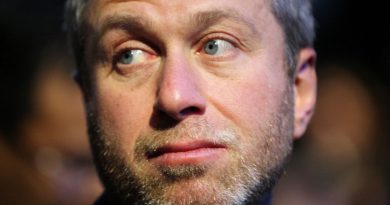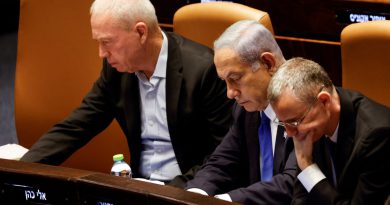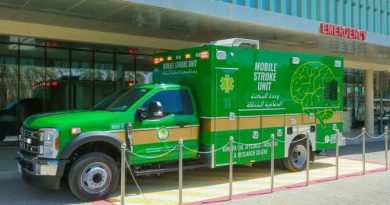Israel’s Independence, Memorial Days plagued by divisions
Jerusalem (AP) — The contradictions that make up Israel — its economic and military prowess and its deep divisions and rancorous politics — were on full display Tuesday as the country mourned its fallen soldiers and began celebrating its 75th Independence Day.
The jarring transition from Israel’s Memorial Day to its landmark anniversary ceremony, meant to be a stunning display of unity that transcends the usual noise of Israeli politics, came as the country faces one of the gravest crises in its history. The events reflected the troubles of a nation preoccupied not only with its external enemies but with its internal conflicts.
A plan by Prime Minister Benjamin Netanyahu’s far-right government to overhaul the judiciary has stoked widespread discontent and spurred weeks of protests that have brought cities to a standstill. Critics fear the changes would weaken the Supreme Court and erode the country’s democratic character. Netanyahu and his supporters argue the overhaul is needed to rein in a liberal and overly interventionist court of unelected judges.
Fighter pilots have threatened to stop reporting for duty. High-tech investors have considered relocating. The nation’s leaders have openly warned of civil war. Following weeks of mass protests and dissent from within his own coalition, Netanyahu said he would pause the overhaul in hopes of finding a compromise.
On Tuesday, arguments and protests over the judicial crisis broke out at a few burial sites, offering what many Israelis considered to be an undignified backdrop for the most solemn day on Israel’s national calendar, in honor of its 24,213 war dead and 4,255 victims of militant attacks.
At a cemetery in the southern city of Beersheba, hard-line National Security Minister Itamar Ben-Gvir attended and addressed a Memorial Day ceremony, even after bereaved families appealed to him to stay away — or at least not speak on behalf of the government. When he was 18, Ben-Gvir was banned from compulsory military service on the grounds of his extremist ideology and conviction for incitement to racism and support for a terrorist group.
Even before Ben-Gvir turned up at the graveyard, scuffles and insult-laden shouting matches broke out between his supporters and opponents. Some attendees threw water at each other after the ceremony.
In Tel Aviv, a group of bereaved families held a separate ceremony to avoid visiting cemeteries and interacting with right-wing politicians whose presence drew shouts of “Shame!” from protesters.
“This year, the Israeli nation is torn between extremists,” said Israel Shur, who attended an alternative ceremony in Tel Aviv near the building where Israeli independence was declared 75 years ago. “We don’t want to confront the politician bringing their agenda inside our sacred place.”
As is customary, people across the country came to a standstill for two minutes when the whine of air raid sirens sounded late in the morning. Motorists and pedestrians froze in the street, got out of their cars and stood with heads bowed. Bereaved families visited cemeteries while television and radio programming shifted to somber music and documentaries about slain soldiers.
“Citizens of Israel, the siren this year, the intensely Israeli signature call, is a wake-up call for all of us. The cost of internal strife is heavy,” Israel’s figurehead President Isaac Herzog said late Monday.
In a speech at the ceremony at a Jerusalem military cemetery, Prime Minister Benjamin Netanyahu recalled the lives of several fallen soldiers and spoke of the “brotherhood” of the Israeli people, a kinship fortified by military service that is compulsory for most Jews.
“We will stand together as brothers and ensure our independence from generation to generation,” Netanyahu said. “We will bow our heads to the bravery of the fallen.”
After sundown on Tuesday, the country shifted from its melancholic contemplation to exuberant celebration, kicking off its 75th Independence Day as trumpets blared and drums rolled. The doleful ballads performed at the military cemetery on Mount Herzl became pulsating dance tunes. The dark space became illuminated by flashing blue and white lights.
Netanyahu sought to emphasize national unity in his pre-recorded address at the mass commemoration. “Doing it together means crying together in memorial services and rejoicing together at Independence Day,” he said.
Yet even as the party got underway and the speaker of parliament, Amir Ohana, began lighting the first of 12 torches, representing the 12 tribes of Israel, crowds of anti-government protesters poured into the streets of central Tel Aviv. They unfurled a massive banner featuring a blazing torch labeled “Democracy.”
Protesters also planned demonstrations for Saturday — the 17th week in a row. The Israeli parliament, the Knesset, is set to resume next week following its break over the national holidays.
The Independence Day celebration went smoothly despite swirling fears of disturbances. Transportation Minister Miri Regev, who is overseeing the ceremony, had directed the event’s organizers to cut away from the live broadcast in the event of anti-government protests, Channel 12 News, Israel’s top television program, reported.
Israel declared independence on May 14, 1948, but the holiday, like all national holidays, is observed according to the Hebrew calendar. Palestinians generally commemorate what they call the “nakba,” or the “catastrophe,” of 1948 — in which hundreds of thousands of them fled or were forced from their homes during the war surrounding Israel’s creation — on May 15.
This year’s commemorations come as Israeli-Palestinian fighting in the occupied West Bank surges to heights unseen in years. Just before the sirens wailed on Tuesday, the Israeli military said a Palestinian shooting attack in the West Bank wounded an Israeli.
A day earlier, Israeli security forces killed a Palestinian man in a West Bank raid and five people were wounded when a Palestinian rammed his car into pedestrians near a popular Jerusalem market before being shot and killed.
Israel has fought half a dozen wars with neighboring Arab countries, battled two Palestinian uprisings and endured scores of deadly militant attacks since its establishment in 1948.



